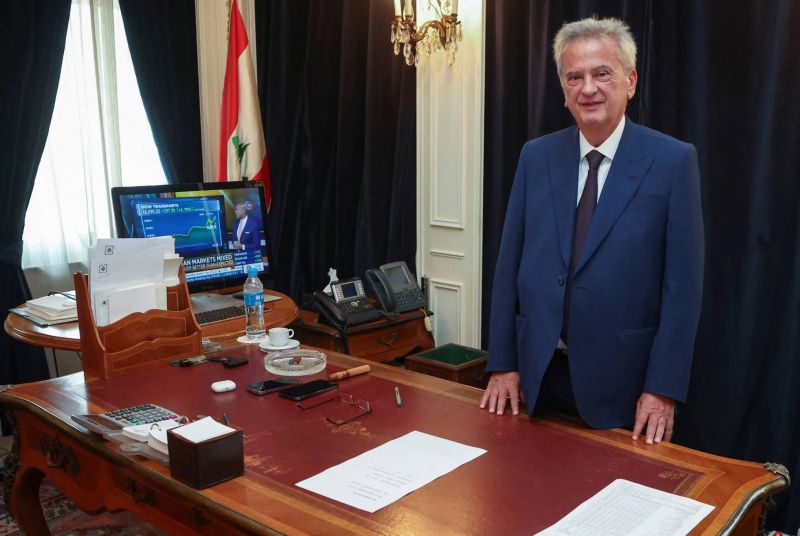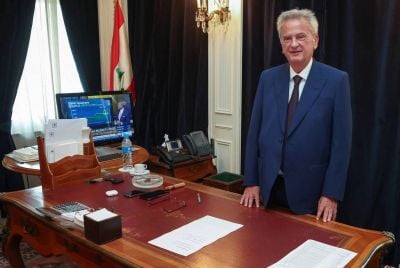
Longtime chief of Banque du Liban (BDL), Riad Salameh, poses as he leaves office after a 30-year tenure, July 31, 2023. (Credit: Mohamed Azakir/Reuters)
BEIRUT — Lebanon’s financial intelligence unit announced on Aug. 14 that the bank accounts of former Banque du Liban (BDL) Governor Riad Salameh had been frozen amid ongoing investigations.
The Special Investigation Commission (SIC) said that similar measures are being taken to target Salameh’s brother Raja; his son, Nady; his former assistant, Marianne Hoayek; and his former romantic partner, Anna Kosakova. On Aug. 10, the US, Canada and Britain jointly sanctioned Salameh and his associates for alleged corruption.
This comes after a forensic audit report of the BDL by the international consultancy firm Alvarez & Marsal claimed to have uncovered evidence of a “commission scheme” for which Salameh and his associates are being investigated. Salameh is accused of diverting hundreds of millions of dollars in commissions from the sale of central bank assets through a company owned by his brother, Raja.
So far, Salameh and his associates have denied all allegations. On Aug. 11, Salameh told Reuters that the commission payments cited by A&M were done in a way "not to be a cost on BDL."
So what happens now? Lawyer and tax advisor Karim Daher answers L'Orient Today's questions.
What does the bank account freeze for Riad Salameh and his circle mean?
The answer is mainly provided in Law No 44 dated Nov. 24, 2015 (fighting money laundering and terrorist financing).
[The law states that the SIC can decide ''after conducting the necessary audit and analysis, to permanently freeze the concerned accounts and/or transactions, and/or to lift the banking secrecy in favor of the competent judicial authorities and the Higher Banking Commission represented by its Chairman on accounts or transactions suspected to be related to money laundering or terrorist financing.'' It adds that the SIC ''may withdraw any of its decisions, in whole or in part, in case it obtains any new relevant information.'']
During the account freezing, all transactions are stopped from the bank accounts of the targeted persons.
Usually, the salary (or part of the salary) or the pension may not be seized and is left in order for him to have enough income to live.
However, Salameh had surely envisaged several smart solutions through either cash money or nominees holding assets and money for him or even saving accounts in non-complying jurisdictions.
What happens now to the assets?
The assets will be seized and if a final court order criminalizing their acts is issued, their assets will revert to the Lebanese State.
[Law 44/2015 stipulates that ''the movable or immovable assets that are proved, by a final Court ruling, to be related to, or derived from, a money-laundering or terrorist financing offence, shall be confiscated to the benefit of the state, unless the owners of the said assets prove in a Court of Law their legal rights thereupon. The confiscated assets may be shared with other countries, whenever the confiscation results directly from coordinated investigations or cooperation between the concerned Lebanese authorities and the concerned foreign body(ies).''
However, if legal prosecutions are dismissed, charges are dropped, or in the case of a final judgement or decision that ceases the legal proceedings or states the innocence of the holders of frozen accounts or assets ''the frozen accounts and all other assets shall be deemed free.'']
Why did the SIC order the account freeze now?
Because they have been listed on the OFAC [the US Treasury Department's Office of Foreign Assets Control] list and sanctioned.
Nobody in Lebanon dares not abide by such sanctions, despite the fact that the same people have been seriously prosecuted locally and in Europe while no one reacted to that, especially the SIC.
Not even the concerned banks and financial institutions (licensed by BDL) which could be held liable and sanctioned in their turn, (reacted to the prosecutions). This may create a domino effect.
Why is the US sanctioning Salameh important in general, and more so than Europeans? Why is it that, when he gets sanctioned in the US, his assets de facto get frozen here? And what do we mean by "the domino effect"?
Because the US dollar and the economic power is prevailing over anything else. The persons and entities not abiding will be sanctioned worldwide and thrown out of the system.
The domino’s effect is twofold: On the one hand, through the scrutinizing of the accounts and the deep forensic audit by tracing the transfers and operations, we will discover other frauds and illegal operations and transactions with the concerned persons; and on the other hand, many of those will rely on the law protecting whistleblowers to provide useful information and diminish their sanction.
All the mafia systems will collapse!
What happens to everybody else who is allegedly involved?
All the people who have facilitated or contributed may be prosecuted for collusion and complicity of money laundering. Article 3 of the law says that could result in three to seven years in jail. Or, in case of failure to apply the law (Law No 44 dated Nov. 24, 2015, on fighting money laundering and financing terrorism), they could face two months to one year in jail, according to Article 13 of the law.
More generally, what could be the consequences of the proceedings against Salameh in Lebanon and abroad?
Actually, he may face several criminal sanctions and fines and not only in connection with money laundering. He may also be prosecuted for acts of corruption (embezzlement, abuse of post, bribery, traffic of influence, etc.) as stated in Article 351 and following the Lebanese Criminal Code.
It goes without saying that, if he is sentenced, he will suffer the longest prison sentence.
Besides, he may be sentenced abroad in each country concerned for his unlawful and criminal actions (France, Germany, Switzerland, etc.). In all events the assets will be confiscated to the benefit of the Lebanese State and abroad in accordance with the United Nations Convention Against Corruption (UNCAC) and the local foreign laws, which tend to allow the return of money used for sustainable development or against poverty or to compensate people who have suffered from corruption.
